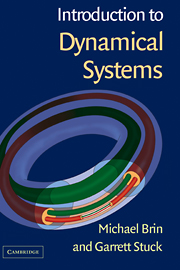6 - Ergodicity of Anosov Diffeomorphisms
Published online by Cambridge University Press: 06 July 2010
Summary
The purpose of this chapter is to establish the ergodicity of volumepreserving Anosov diffeomorphisms (Theorem 6.3.1). This result, which was first obtained by D. Anosov, shows that hyperbolicity has strong implications for the ergodic properties of a dynamical system. Moreover, since a small perturbation of an Anosov diffeomorphism is also Anosov (Proposition 5.10.2), this gives an open set of ergodic diffeomorphisms.
Our proof is an improvement of the arguments in and. It is based on the classical approach called Hopf's argument. The first observation is that any f -invariant function is constant mod 0 on the stable and unstable manifolds (Lemma 6.3.2). Since these manifolds have complementary dimensions, one would expect the Fubini theorem to imply that the function is constant mod 0, and ergodicity would follow. The major difficulty is that, although the stable and unstable manifolds are differentiable, they need not depend differentiably on the point they pass through, even if f is real analytic. Thus the local product structure defined by the stable and unstable foliations does not yield a differentiable coordinate system, and we cannot apply the usual Fubini theorem. So we establish a property of the stable and unstable foliations called absolute continuity that implies the Fubini theorem.
The reason the stable and unstable manifolds do not vary differentiably is that they depend on the infinite future and past, respectively.
- Type
- Chapter
- Information
- Introduction to Dynamical Systems , pp. 141 - 152Publisher: Cambridge University PressPrint publication year: 2002



